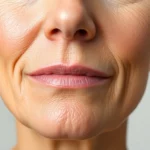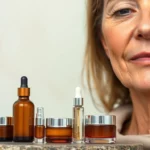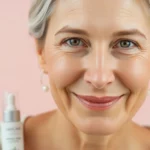Do you notice new lines or a loss of bounce in your skin? You’re not alone. Anti-aging serums can help slow down the clock by delivering powerful ingredients directly to your skin. This guide will help you find the perfect serum for your needs, covering key ingredients, skin types, and top product recommendations.
Understanding the Needs of Aging Skin
Aging skin shows signs like wrinkles, spots, and dryness. These changes are natural but can be managed with the right skincare.
What Happens to Skin With Age?
As we age, collagen and elastin production decreases, leading to wrinkles and less elasticity. Skin cell regeneration slows, and the skin becomes drier. Collagen production declines by about 1% each year after age 20.
Common Signs of Aging Skin
Wrinkles, fine lines, age spots, dryness, and uneven skin tone are common signs of aging. Laugh lines may become more prominent, and skin may lose its firmness.
Key Ingredients to Look For
Certain ingredients are game-changers in anti-aging serums. Here’s what to look for:
Retinoids: The Gold Standard
Retinoids, like retinol and retinoic acid, boost cell turnover and collagen production, reducing wrinkles. Start with a low concentration and use at night to avoid irritation.
Hyaluronic Acid: Hydration Hero
Hyaluronic acid attracts and retains moisture, plumping the skin and minimizing fine lines. It’s perfect for keeping skin hydrated.
Vitamin C: Brightening and Protection
Vitamin C is an antioxidant that protects against free radicals, brightens skin, evens tone, and fades dark spots for a radiant glow.
Peptides: Collagen Building Blocks
Peptides are small proteins that signal the skin to produce more collagen, improving firmness and reducing wrinkles.
How to Choose the Right Serum for Your Skin Type
Not all serums work for every skin type. Here’s how to find the best match:
Dry Skin
Opt for serums with hydrating ingredients like hyaluronic acid and ceramides. Avoid alcohol-based formulas that can dry out the skin further.
Oily Skin
Choose lightweight, non-comedogenic serums with ingredients like salicylic acid and niacinamide to control oil and prevent breakouts.
Sensitive Skin
Look for gentle, fragrance-free serums with calming ingredients. Always patch-test new products to avoid irritation.
Combination Skin
Use different serums for dry and oily areas. Hydrating serums work well on dry patches, while lightweight serums are better for oily zones.
Top Anti-Aging Serums
Here are some top-rated serums for different needs:
Best Overall Serum
Look for a serum with retinoids, vitamin C, and hyaluronic acid. XYZ Anti-Aging Serum is a great option that balances these key ingredients.
Best for Fine Lines and Wrinkles
Serums with retinoids or peptides, like ABC Wrinkle Repair Serum, are excellent for smoothing fine lines.
Best for Dry Skin
PQR Hydrating Serum, packed with hyaluronic acid, is perfect for dry skin.
Best for Sensitive Skin
LMN Soothing Serum is gentle and free of harsh ingredients, making it ideal for sensitive skin.
How to Incorporate a Serum into Your Skincare Routine
Using a serum correctly maximizes its benefits. Here’s how:
When to Apply Serum
Apply serum after cleansing and toning, either in the morning or at night. Nighttime is ideal for active ingredients like retinol.
How to Apply Serum
Gently pat a few drops of serum onto your face. Avoid rubbing to prevent irritation.
Layering Serums
You can layer serums, but avoid combining retinoids and vitamin C. Use them at different times to prevent irritation.
Conclusion
Finding the perfect anti-aging serum takes time, but it’s worth the effort. Consider your skin type and concerns, look for key ingredients, and be consistent with your routine. With the right serum, you can achieve youthful, radiant skin.













